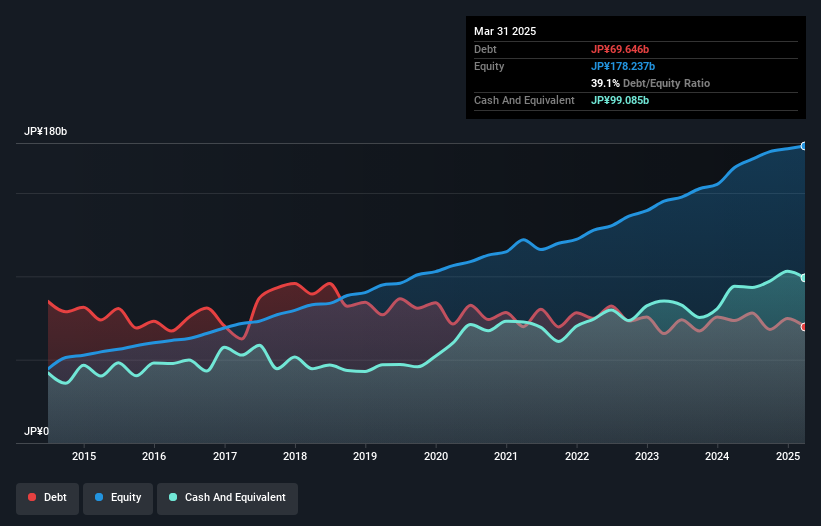Some say volatility, rather than debt, is the best way to think about risk as an investor, but Warren Buffett famously said that 'Volatility is far from synonymous with risk.' So it seems the smart money knows that debt - which is usually involved in bankruptcies - is a very important factor, when you assess how risky a company is. Importantly, Starts Corporation Inc. (TSE:8850) does carry debt. But the more important question is: how much risk is that debt creating?
When Is Debt A Problem?
Debt and other liabilities become risky for a business when it cannot easily fulfill those obligations, either with free cash flow or by raising capital at an attractive price. Part and parcel of capitalism is the process of 'creative destruction' where failed businesses are mercilessly liquidated by their bankers. However, a more usual (but still expensive) situation is where a company must dilute shareholders at a cheap share price simply to get debt under control. By replacing dilution, though, debt can be an extremely good tool for businesses that need capital to invest in growth at high rates of return. When we think about a company's use of debt, we first look at cash and debt together.
What Is Starts's Net Debt?
As you can see below, Starts had JP¥69.6b of debt at March 2025, down from JP¥73.4b a year prior. But on the other hand it also has JP¥99.1b in cash, leading to a JP¥29.4b net cash position.

How Healthy Is Starts' Balance Sheet?
We can see from the most recent balance sheet that Starts had liabilities of JP¥95.5b falling due within a year, and liabilities of JP¥59.9b due beyond that. On the other hand, it had cash of JP¥99.1b and JP¥14.4b worth of receivables due within a year. So its liabilities outweigh the sum of its cash and (near-term) receivables by JP¥41.9b.
This deficit isn't so bad because Starts is worth JP¥203.8b, and thus could probably raise enough capital to shore up its balance sheet, if the need arose. However, it is still worthwhile taking a close look at its ability to pay off debt. While it does have liabilities worth noting, Starts also has more cash than debt, so we're pretty confident it can manage its debt safely.
See our latest analysis for Starts
Fortunately, Starts grew its EBIT by 7.1% in the last year, making that debt load look even more manageable. The balance sheet is clearly the area to focus on when you are analysing debt. But ultimately the future profitability of the business will decide if Starts can strengthen its balance sheet over time. So if you're focused on the future you can check out this free report showing analyst profit forecasts.
Finally, a business needs free cash flow to pay off debt; accounting profits just don't cut it. Starts may have net cash on the balance sheet, but it is still interesting to look at how well the business converts its earnings before interest and tax (EBIT) to free cash flow, because that will influence both its need for, and its capacity to manage debt. During the last three years, Starts produced sturdy free cash flow equating to 53% of its EBIT, about what we'd expect. This cold hard cash means it can reduce its debt when it wants to.
Summing Up
Although Starts's balance sheet isn't particularly strong, due to the total liabilities, it is clearly positive to see that it has net cash of JP¥29.4b. And it also grew its EBIT by 7.1% over the last year. So we don't have any problem with Starts's use of debt. There's no doubt that we learn most about debt from the balance sheet. However, not all investment risk resides within the balance sheet - far from it. For example, we've discovered 1 warning sign for Starts that you should be aware of before investing here.
At the end of the day, it's often better to focus on companies that are free from net debt. You can access our special list of such companies (all with a track record of profit growth). It's free.
New: Manage All Your Stock Portfolios in One Place
We've created the ultimate portfolio companion for stock investors, and it's free.
• Connect an unlimited number of Portfolios and see your total in one currency
• Be alerted to new Warning Signs or Risks via email or mobile
• Track the Fair Value of your stocks
Have feedback on this article? Concerned about the content? Get in touch with us directly. Alternatively, email editorial-team (at) simplywallst.com.
This article by Simply Wall St is general in nature. We provide commentary based on historical data and analyst forecasts only using an unbiased methodology and our articles are not intended to be financial advice. It does not constitute a recommendation to buy or sell any stock, and does not take account of your objectives, or your financial situation. We aim to bring you long-term focused analysis driven by fundamental data. Note that our analysis may not factor in the latest price-sensitive company announcements or qualitative material. Simply Wall St has no position in any stocks mentioned.
About TSE:8850
Starts
Engages in the construction, real estate management, and tenant recruitment in Japan and internationally.
Flawless balance sheet, good value and pays a dividend.
Market Insights
Community Narratives



